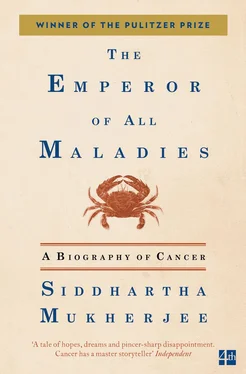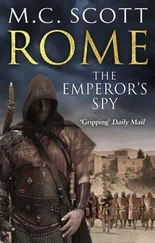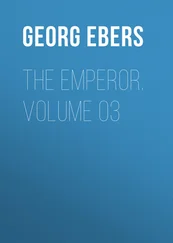On the afternoon of May 19, Carla dropped her three children with a neighbor and drove herself back to the clinic, demanding to have some blood tests. Her doctor ordered a routine test to check her blood counts. As the technician drew a tube of blood from her vein, he looked closely at the blood’s color, obviously intrigued. Watery, pale, and dilute, the liquid that welled out of Carla’s veins hardly resembled blood.
Carla waited the rest of the day without any news. At a fish market the next morning, she received a call.
“We need to draw some blood again,” the nurse from the clinic said.
“When should I come?” Carla asked, planning her hectic day. She remembers looking up at the clock on the wall. A half-pound steak of salmon was warming in her shopping basket, threatening to spoil if she left it out too long.
In the end, commonplace particulars make up Carla’s memories of illness: the clock, the car pool, the children, a tube of pale blood, a missed shower, the fish in the sun, the tightening tone of a voice on the phone. Carla cannot recall much of what the nurse said, only a general sense of urgency. “Come now,” she thinks the nurse said. “Come now.”

I heard about Carla’s case at seven o’clock on the morning of May 21, on a train speeding between Kendall Square and Charles Street in Boston. The sentence that flickered on my beeper had the staccato and deadpan force of a true medical emergency: Carla Reed/New patient with leukemia/14th Floor/Please see as soon as you arrive. As the train shot out of a long, dark tunnel, the glass towers of the Massachusetts General Hospital suddenly loomed into view, and I could see the windows of the fourteenth floor rooms.
Carla, I guessed, was sitting in one of those rooms by herself, terrifyingly alone. Outside the room, a buzz of frantic activity had probably begun. Tubes of blood were shuttling between the ward and the laboratories on the second floor. Nurses were moving about with specimens, interns collecting data for morning reports, alarms beeping, pages being sent out. Somewhere in the depths of the hospital, a microscope was flickering on, with the cells in Carla’s blood coming into focus under its lens.
I can feel relatively certain about all of this because the arrival of a patient with acute leukemia still sends a shiver down the hospital’s spine—all the way from the cancer wards on its upper floors to the clinical laboratories buried deep in the basement. Leukemia is cancer of the white blood cells—cancer in one of its most explosive, violent incarnations. As one nurse on the wards often liked to remind her patients, with this disease “even a paper cut is an emergency.”
For an oncologist in training, too, leukemia represents a special incarnation of cancer. Its pace, its acuity, its breathtaking, inexorable arc of growth forces rapid, often drastic decisions; it is terrifying to experience, terrifying to observe, and terrifying to treat. The body invaded by leukemia is pushed to its brittle physiological limit—every system, heart, lung, blood, working at the knife-edge of its performance. The nurses filled me in on the gaps in the story. Blood tests performed by Carla’s doctor had revealed that her red cell count was critically low, less than a third of normal. Instead of normal white cells, her blood was packed with millions of large, malignant white cells—blasts, in the vocabulary of cancer. Her doctor, having finally stumbled upon the real diagnosis, had sent her to the Massachusetts General Hospital.

In the long, bare hall outside Carla’s room, in the antiseptic gleam of the floor just mopped with diluted bleach, I ran through the list of tests that would be needed on her blood and mentally rehearsed the conversation I would have with her. There was, I noted ruefully, something rehearsed and robotic even about my sympathy. This was the tenth month of my “fellowship” in oncology—a two-year immersive medical program to train cancer specialists—and I felt as if I had gravitated to my lowest point. In those ten indescribably poignant and difficult months, dozens of patients in my care had died. I felt I was slowly becoming inured to the deaths and the desolation—vaccinated against the constant emotional brunt.
There were seven such cancer fellows at this hospital. On paper, we seemed like a formidable force: graduates of five medical schools and four teaching hospitals, sixty-six years of medical and scientific training, and twelve postgraduate degrees among us. But none of those years or degrees could possibly have prepared us for this training program. Medical school, internship, and residency had been physically and emotionally grueling, but the first months of the fellowship flicked away those memories as if all of that had been child’s play, the kindergarten of medical training.
Cancer was an all-consuming presence in our lives. It invaded our imaginations; it occupied our memories; it infiltrated every conversation, every thought. And if we, as physicians, found ourselves immersed in cancer, then our patients found their lives virtually obliterated by the disease. In Aleksandr Solzhenitsyn’s novel 4Cancer Ward, Pavel Nikolayevich Rusanov, a youthful Russian in his midforties, discovers that he has a tumor in his neck and is immediately whisked away into a cancer ward in some nameless hospital in the frigid north. The diagnosis of cancer—not the disease, but the mere stigma of its presence—becomes a death sentence for Rusanov. The illness strips him of his identity. It dresses him in a patient’s smock (a tragicomically cruel costume, no less blighting than a prisoner’s jumpsuit) and assumes absolute control of his actions. To be diagnosed with cancer, Rusanov discovers, is to enter a borderless medical gulag, a state even more invasive and paralyzing than the one that he has left behind. (Solzhenitsyn may have intended his absurdly totalitarian cancer hospital to parallel the absurdly totalitarian state outside it, yet when I once asked a woman with invasive cervical cancer about the parallel, she said sardonically, “Unfortunately, I did not need any metaphors to read the book. The cancer ward was my confining state, my prison.”)
As a doctor learning to tend cancer patients, I had only a partial glimpse of this confinement. But even skirting its periphery, I could still feel its power—the dense, insistent gravitational tug that pulls everything and everyone into the orbit of cancer. A colleague, freshly out of his fellowship, pulled me aside on my first week to offer some advice. “It’s called an immersive training program,” he said, lowering his voice. “But by immersive, they really mean drowning. Don’t let it work its way into everything you do. Have a life outside the hospital. You’ll need it, or you’ll get swallowed.”
But it was impossible not to be swallowed. In the parking lot of the hospital, a chilly, concrete box lit by neon floodlights, I spent the end of every evening after rounds in stunned incoherence, the car radio crackling vacantly in the background, as I compulsively tried to reconstruct the events of the day. The stories of my patients consumed me, and the decisions that I made haunted me. Was it worthwhile continuing yet another round of chemotherapy on a sixty-six-year-old pharmacist with lung cancer who had failed all other drugs? Was is better to try a tested and potent combination of drugs on a twenty-six-year-old woman with Hodgkin’s disease and risk losing her fertility, or to choose a more experimental combination that might spare it? Should a Spanish-speaking mother of three with colon cancer be enrolled in a new clinical trial when she can barely read the formal and inscrutable language of the consent forms?
Читать дальше













